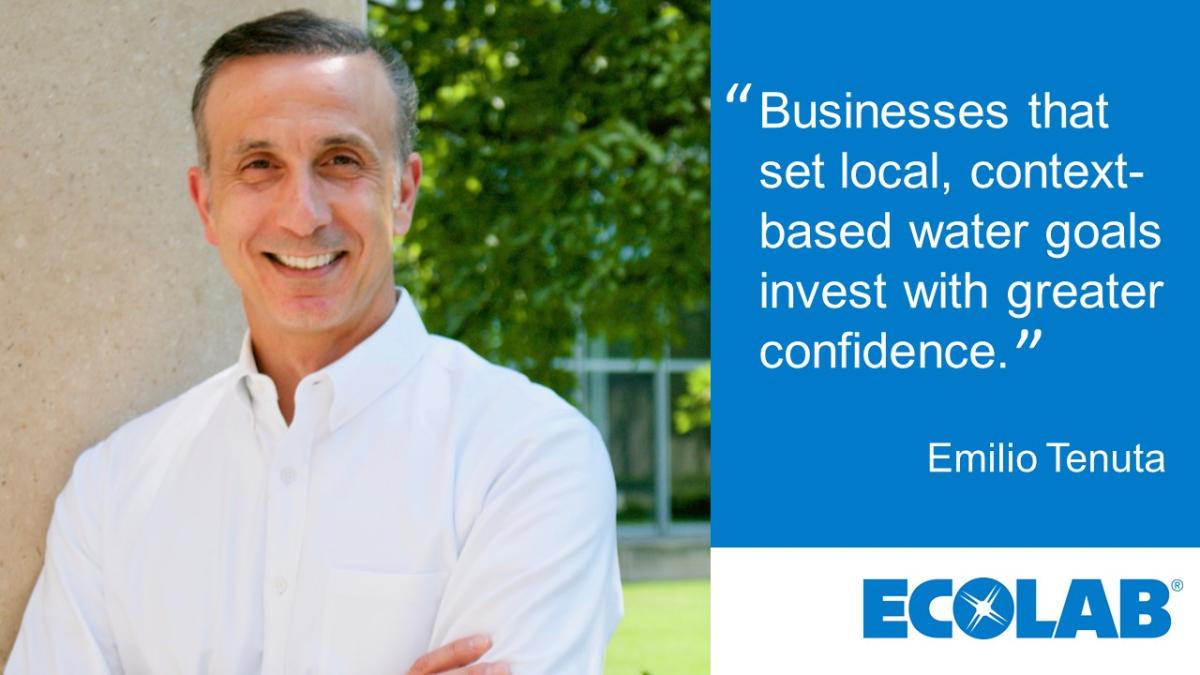Save Water Locally, Grow Your Business Globally
Save water locally, grow your business globally
Water is on executives’ minds these days. More and more, business people realize that water scarcity is the new normal, and if they want to put their companies in a position to keep growing, they have to adapt. I can confirm that much after living out of suitcases for most of the month of June and, at conference after conference, meeting numerous business leaders who expressed their sense of urgency about the topic.
It’s not news that companies are concerned about water security. A survey Ecolab conducted with GreenBiz in 2017 showed that 75 percent have corporate water targets. But it also taught us that 82 percent didn’t have the tools and strategies and to take appropriate action.
That is changing. More and more businesses realize that the battle against water scarcity has to be about more than corporate target-setting. It has to be won at the local level, facility by facility and plant by plant.
That makes sense, because although both are tightly interwoven, water isn’t climate. When you emit greenhouse gasses, those affect the totality of the atmosphere. But water scarcity, which will become more pronounced because of climate change, plays out at the local level. The challenges in Arizona, for instance, are very different from those in Louisiana.
To be truly effective, water management solutions have to be context-based. Individual water users mostly share risks with others who operate in the same basin, whether those are industrial facilities, agricultural operations or communities. Water targets are more meaningful when they are aligned with the needs of the broader community. Businesses that set these context-based goals can make investments with greater confidence, positioning themselves as better neighbors and corporate citizens and reducing risk to their growth strategies.
At Ecolab, we know that first-hand. Our customer-facing teams work at nearly 3 million locations in more than 170 countries. We deal with water issues in businesses that vary from your local restaurant to massive steel mills, and machinery from individual dishwashers to huge industrial cooling towers.
Last year, we helped our customers manage more than 1.1 trillion gallons of water, saving more than 171 billion gallons along the way. (You can read all about that in our new sustainability report). That’s equivalent to the drinking water needs of almost 600 million people. Those are massive numbers, but they’re the aggregate of millions of individual interactions with customers, all in their own locales, facing different challenges and requiring different solutions.
That’s how we’ve learned all too well that the right solutions will necessarily have to be tailored to an almost infinite variety of local factors. But when you save a few thousand gallons here and a couple of million there, pretty soon you are talking about real numbers.
As we go about our business with all those customers, we can scale up our learning. These days, Ecolab is laser-focused on linking up the mountains of data we gather every day. Mining all that data and building an internet of things for water, we can discern trends that were heretofore invisible, predict problems before they arise and come up with smart solutions that will save our customers more water, energy and money.
That’s how, working together, we’ll be able to make an exponential impact. With the world’s population and its economies growing at a steady clip, we should do no less. If we are to avoid a crisis down the line, we must take circular solutions for how we use scarce resources to the next level. And water is an excellent avenue of attack.
From experience we know that companies that manage their water well manage their overall business well. Using water means you have to heat it, cool it, pump it and process it. That takes money and energy. In other words: If you find smart ways to enable your local facilities to save and reuse water, you’ll operate your business more efficiently, improve your bottom line, lower your energy use and greenhouse gas emissions, and reduce your impact on surrounding communities, leaving more resources for the people with whom you share your watershed.
As an added bonus, you’ll be able to rest assured in the knowledge that you’ve upped your company’s resilience for a water-scarce future and done your part in preserving the planet we all share. It’s the right thing to do, and it makes 100 percent business sense. And when those things come together, big change can happen.


